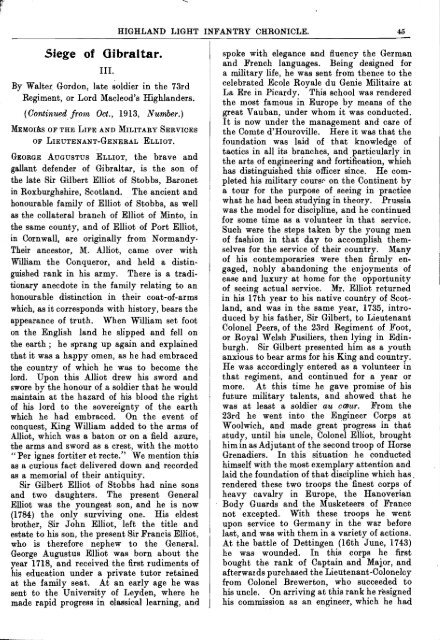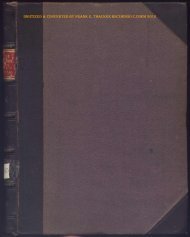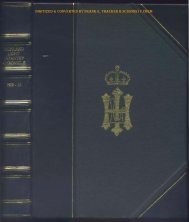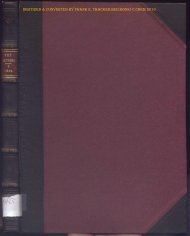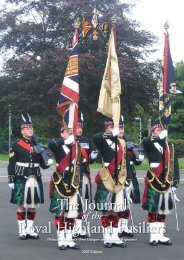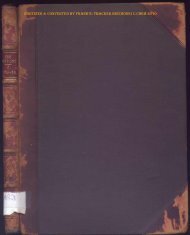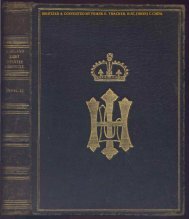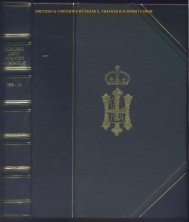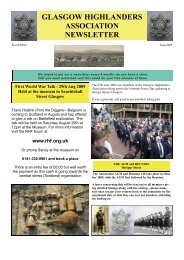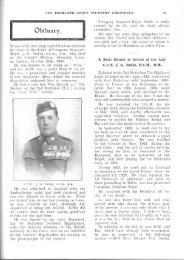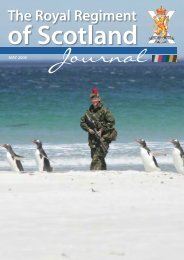HIGHLAND LIGHT INFANTRY CHRONICLE.Siege of Gibraltar.Ill.By WaIter, Gordon, late ~oldier in the 73rdRegiment, or Lord Macleod's <strong>Highland</strong>ers.(Oontinued from Oct., 1913, Number.)MEMOIRS OF THE LIFE AND MILITARY SERVICESOF LIEUTENANT-GENERAL ELLIOT.GEORGE AUGUSTUS ELLIOT, the brave andgallant defender of Gibraltar, is the son ofthe late Sir Gilbert Elliot of Stobbs, Baronetin Roxburghshire, Scotland. <strong>The</strong> ancient andhonourable family of Elliot of Stobbs, as wellas the collateral branch of Elliot of Minto, inthe same county, and of Elliot of Port Elliot,in Cornwall, are originally from Normandy.<strong>The</strong>ir ancestor, M. Alliot, came over withWilliam the Conqueror, and held a distinguishedrank in his army. <strong>The</strong>re is a traditionaryanecdote in the family relating to anhonourable distinction in their coat-of-armswhich, as it corresponds with history, bears theappearance of truth. When William set footon the English land he slipped and fell onthe earth; he sprang up again and explainedthat it was a happy omen, as he had embracedthe country of which he was to become thelord. Upon this Alliot drew his sword andswore by the honour of a soldier that he wouldmaintain at the hazard of his blood the rightof his lord to the sovereignty of the earthwhich he had embraced. On the event ofconquest, King William added to the arms ofAlliot, which was a baton or on a field azure,the arms and sword as a crest, with the motto"Per ignes fortiter et recte." We mention thisas a curious fact delivered down and recordedas a memorial of their antiquity.Sir Gilbert Elliot of Stobbs had nine sonsand two daughters. <strong>The</strong> present GeneralElliot was the youngest son, and he is now(1784) the only surviving one. His eldestbrother, Sir John Elliot, left the title andestate to his son, the present Sir Francis Elliot,who is therefore nephew to the General.George Augustus Elliotwas born about theyear 1718, and received the first rudiments ofhis education under a private tutor retainedat the family seat. At an early age he wassent to the University of Leyden, where hemade rapid progress in classical learning, andspoke with elegance and fluency the Germanand French languages. Being designed fora military life, he was sent from thence to thecelebrated Ecole <strong>Royal</strong>e du Genie Militaire atLa Ere in Picardy. This school was renderedthe most famous in Europe by means of thegreat Vauban, under whom it was conducted.It is now under the management and care ofthe Comte d'Houroville. Here it was that thefoundation was laid of that knowledge oftactics in all its branches, and particularly inthe arts of engineering and fortification, whichhas distinguished this officer since. He completedhis military course' on the Continent bya tour for the purpose of seeing in practicewhat he had been studying in theory. Prussiawas the model for discipline, and he continuedfor some time as a volunteer in that service.Such were the steps taken by the young menof fashion in that day to accomplish themselvesfor the service of their country. Manyof his contemporaries were then firInly engaged,nobly abandoning the enjoyments ofease and luxury at home for the opportunityof seeing actual service. Mr. Elliot returnedin his 17th year to his native country of Scotland,and was in the same year, 1735, introducedby his father, Sir Gilbert, to LieutenantColonel Peers, of the 23rd Regiment of Foot,or <strong>Royal</strong> Welsh <strong>Fusiliers</strong>, then lying in Edinburgh.Sir Gilbert presented him as a youthanxious to bear arms for his King and country.He was accordingly entered as a volunteer inthat regiment, and continued for a year ormore. At this time he gave promise of hisfuture military talents, and showed that hewas at least a soldier au calur. From the23rd he went into the Engineer Corps atW oolwich, and made great progress in thatstudy, until his uncle, Colonel ElIiot, broughthim in as Adjutant of the second troop of HorseGrenadiers. In this situation he conductedhimself with the most y attention andlaid the foundation of that scipline which has.rendered these two troops the finest corps ofheavy cavalry in Europe, the HanoverianBody Guards and the Musketeers of Francenot excepted. With these troops he wentupon service to Germany in the war beforelast, and was with them in a variety of actions.At the battle of Dettingen (16th June, 174:3)he was wounded. In this corps he firstbought the rank of Captain and Maj,or, andafterwards purchased the Lieutenant-Colonelcyfrom Colonel Brewerton, who succeeded tohis uncle. On arriving at this rank he resignedhis commission as an engineer, which he had
46 HIGHLAND LIGHT INFANTRY CHRONICl.E.-~.--.--.-..-------..---.-------- ~-----------------'tlDjoyed along with his other rank, and inwhich service he had been actively employedvery much to the advantage of his country.He had received instruction of the famousengineer Bellidor, and made himself completelymaster of the science of gunnery. Hadhe not disinterestedly resigned his rank in theengineer department he would now, byregular profession, have been at the headof that corps. Soon after this he was appointedaide de camp to King George n., andwas already distineuished for his militaryskill and discipline. In the year 1759 hequitted the second troop of Horse GrenadierGuards, being selected to raise, form, anddiscipline the first Regiment of Light Horse,called after him" Elliot's." As soon as theywere raised and formed he was appointed tothe command of the cavalry in the expedition{)n the coast of France, with the rank ofBrigadier-General. After this he passed intoGermany, when he was employed on the staff,and greatly distinguished himself in a varietycl movements, while his regiment displayeda strictness of discipline and an activity andenterprise which gained them signal honour;and, indeed, they have been the patternregiment, both in regard to discipline andappointment, to the many light dragoon troopsthat have since that period been raised in ourService. From Germany he was recalled forthe purpose of being employed as second incommand in the memorable expedition againstthe Havannah. It was possible to find anofficer in the sunshine of the Court to whom,under the patronage of a prince, the trappingsof the chief command might be given; butan Elliot was wanted to act as well as anAlbemarle to shine, and for him they wereforced to go to the dusty plains of Germany.<strong>The</strong> circumst-ances of that conquest are wellknown. Our readers will pardon us for therecital of a short anecdote which occurredimmediately after the reduction, as it shows.that in the very heart and outrages of war theGeneral was not unmindful of the rights ofhumanity.He (General Elliot) was particularly eminentamong the conquerors of the Havannah forhis disinterested procedure in checking thehorrors of indiscriminate plunder. To him,therefore, appeals were most frequently made.A Frenchman, who had suffered greatly bythe depredati.ons of the soldiery, made applicationto him and begged in bad English thathe would interfere to have his propertyrestored. <strong>The</strong> petitioner's wife, who waspresent, a woma·n of great :'lpirit, was angryat her husband for hi.,; intercession, and said" How can you ask or expect a favour from aman who comes designedJy to plunder you? "<strong>The</strong> husband persisting in his application, ~iswife grew more loud in her· censure, and saIdhe was not a true Frenchman. <strong>The</strong> General,who was busy writing at the time, turned tothe woman and said, smiling, "Do not upbraid,madam. What vour husband demands will begranted." <strong>The</strong>' General was so very muchpleased with the woman's spirit that he notonly procured them 'their property again butalso took pains to accommodate them in everyrespect. This has been through life themanlv characteristic of the General: if hewould not suffer his troops to extend, for thesake of plunder, the ravages of war, he neverimpoverished them by unjust exactions.He never would consent that his Quartermaster'splace should be sold, not only, saidhe, " because I think it the reward of an honestveteran soldier, but also because I could notso directly exercise my authority in his dismissionshould he behave ill." On the peace(10th February, 1763) his gallant regimentwas reviewed by His Majesty in Hyde Park,when they presented to the King the standardswhich they had taken from the enemy. <strong>The</strong>King, gratified with their high character,asked General Elliot what mark of his favourhe could bestow on his regiment equal to theirmerits. He answered that his regiment wouldbe proud if His Majesty should think that ?ytheir services they were entitled to the dIStinctionof " <strong>Royal</strong>s." It was accordingly madea <strong>Royal</strong> Regiment with the flattering title" <strong>The</strong>15th or King's <strong>Royal</strong> Regiment of LightDragoons." At the same time the King expresseda desire to confer a mark of his favouron the brave General, but he declared thatthe honour and satisfaction of His Majesty'sapprobation of his services was his best reward.During the peace he was not idle.. His greattalents in the various branches of the militaryart gave him ample employment; and hewas made Commander-in-Chief of the Forcesin Ireland. But he did not continue long onthis station-not even long enough to unpackall his trunks-for, finding that interferenceswere made by petty authority derogatory ofhis own, he resi8ted the practice with becomingspirit, and, not choosing to disturb the Governmentof the sister kingdom on a matterpersonal to himself, he solicited to be recalled,and accordingly was so, when he wa.sappointed to the command of Gibraltar, in a
- Page 1 and 2: digitized & converted by frank e. t
- Page 3: 2 HIGHLAND LIGHT INFANTRY CHRONICLE
- Page 9 and 10: Octobm at Ambala it was qlliu kly l
- Page 11 and 12: 10 HH;J[L A NT therillg to tn ke pl
- Page 13 and 14: 12 HIGJI~AND LIG):J;T INFANTRY CHRO
- Page 15 and 16: 14 HIGHLAND LIGH'I INFANTRY CHRONIC
- Page 17 and 18: HiL~FAN TR YCIl R NICLE.SIIoW Lie u
- Page 19 and 20: 18 HIGHLAND LWHT INFANTltY CHRONICL
- Page 21 and 22: 20 HIGHLAND LIGHT INFANTRY CHRONICL
- Page 23 and 24: 22 HIGHLAND LIGHT INFANTRY CHRONICL
- Page 25 and 26: 24 IlIGHLAND LIGHT INFANTRY CHRONIC
- Page 27 and 28: the match between the above teams i
- Page 29 and 30: :28 HIGHLAXD LIGHT IXJ;'AN'J:RY CHR
- Page 31 and 32: 30 HIGHLAND LIGHT INl!'ANTRY CHRONI
- Page 33 and 34: HIGH LA ND LIGHT INFANTRY CHRONICLE
- Page 35 and 36: HIGHLAND LlGHT INFANTRY CHRONICLE.A
- Page 37 and 38: HIGltLAND LlltHf INFANTRY CHRONICLE
- Page 39 and 40: 38HIGHLAND LIGHT IN}'ANTRY CHRONICL
- Page 41 and 42: 41) HIGHLAND LIGHT INFANTRY CHRONIC
- Page 43 and 44: HIGHLAND LIGHT INFANTRY CH RONT ' L
- Page 45: HIGHLAND LIGHT INFANTRY CHRONICLE.S
- Page 49 and 50: 48HIGHLAND LIGHT INFANTRY CHRONICLE
- Page 51 and 52: 50 HIGHLAND LIGHT INFANTRY CHRONICL
- Page 53 and 54: 52 HIGHI.AND LIGHT INFANTRY CHRONIC
- Page 55 and 56: HIGHLAND LIGH1' INFANTRY CHRONICLE.
- Page 57 and 58: 56 HIGHLAND LIGHT INFANTRY CHRONICL
- Page 59 and 60: 58 HIGHLAND LIGHT INFANTRY CHRONICL
- Page 61 and 62: 60 IIIGnLA.. D LIGHT INFA.NTRY CHRO
- Page 63 and 64: 62The Hi~ hlalld Brigade Dinll(' r
- Page 65 and 66: --------evening's enjoyment was rea
- Page 67 and 68: 66 HIGHLAND LIGHT INFANTRY CHRONICL
- Page 69 and 70: 68 HIGHLAND LIGHT INFAN'rRY CHRONIC
- Page 71 and 72: iJald .lluna v , wllo ha s jll ·t
- Page 73 and 74: ·72 HIGHLAND LIGHT INFANTRY CHJlO~
- Page 75 and 76: 74 HIGHLAND LTGHTI~FANTRY CHllQNICL
- Page 77 and 78: 76 HIGHLAND LIGHT INFANTRY CHRONICL
- Page 79 and 80: --~.-,.~.78 HIGHLAND LIGHTHIGHLAND
- Page 81 and 82: 'llis IOIl ~ ~f' rVi (: l' ~\rl', }
- Page 83 and 84: llWHLAl'D T,IU HT INFANTRY ClIH,()
- Page 85 and 86: 84 HJGHLAND LIGHT INFANTRY CHIWNICL
- Page 87 and 88: 86 HIGHLAND LWHT INFANTRY CHRONICLE
- Page 89 and 90: 88 HIGHLAND LIGHT INFANTRY CHRONICL
- Page 91 and 92: {j() HlHILL \ D LWHT r~l
- Page 93 and 94: 92 HIGHLAND LIGHT INFANTRY CHRONICL
- Page 95 and 96: 94 HIGHLAND LIGHT INFANTRY CHRONICL
- Page 97 and 98:
96HIGHLAND LIGHT INFANTRY CHRONICLE
- Page 99 and 100:
98 HIGHLAND LIGHT INFANTRY CHRONICL
- Page 101 and 102:
100 HIGHLAND LIGHT INFANTRY CHRONIC
- Page 103 and 104:
102 HIGHLAND LIGHT INFANTRY CHRONIC
- Page 105 and 106:
HIGHLAND LIGHT INFANTRY CHRONICLE.-
- Page 107 and 108:
106 HIGHLAND LIGHT INFANTRY CHRONIC
- Page 109 and 110:
----------------------108 HIGHLAN
- Page 111 and 112:
2nd Battalion News."EDITOR S NOTES.
- Page 113 and 114:
112 HWHLAND LIGHT INFANTRY CHRONICL
- Page 115 and 116:
114(Jorrn YIl), I; " ])" Co),., 2 ;
- Page 117 and 118:
'116 HIGHLAND LIGHT INFANTRY CHRONI
- Page 119 and 120:
llX12297 Buy H. ;\1:Loughlin, 2 'Lh
- Page 121 and 122:
120 HIGHLAND LIGH1.'~--. --_._-_._.
- Page 123 and 124:
122 HIGHLAND LIGHT INFANTRY CHRONIC
- Page 125 and 126:
124 HIGHLAND LIGHT INFANTRY CHRONIC
- Page 127 and 128:
12£ HIGHLAND LIGHT INFANTRY CHRONI
- Page 129 and 130:
I ' ..~,128 HIGHLAND LIGHT INFANTRY
- Page 131 and 132:
130 HIGHLAND LIGHT INFAN'l'RY CHRON
- Page 133 and 134:
HIGULAND LIGHT INFANTRY CHRONICLE .
- Page 135 and 136:
HIGHLAND LIGH'l' INFANTRY CHRONICLE
- Page 137 and 138:
136 HIGHLAND LIGHT INFANTRY CHRONIC
- Page 139 and 140:
138 HIGHLAND LIGHT INFANTRY CHRONIC
- Page 141 and 142:
140 HIGHLAND LIGHT INFANTRY CHRONIC
- Page 143 and 144:
142 lllGHLA.KD LIGHT INFANTRY CHRON
- Page 145 and 146:
HIGHLAND LIGHT INFANTRY CHRONICLE.m
- Page 147 and 148:
HIGHLAND 'LIGllT INFANTRY CHRONICLE
- Page 149 and 150:
z0
- Page 151 and 152:
148 HIGHLAND LIGHT INFANTRY CHRONIC
- Page 153 and 154:
HIGHLAND LIGHT INFANTRY CHRONWLE.14
- Page 155 and 156:
21'D L1 GU't . H. n. Ir. KJ, fTl "K
- Page 157 and 158:
152 HIGHLAND LIGHT INFANTRY CHRONIC
- Page 159 and 160:
154 HIGHLAND LIGHT INFANTRY CHRONIC
- Page 161 and 162:
156 HIGHLAND LIGHT INFANTRY CHRONIC
- Page 163 and 164:
158 HIGHLAND LIGHT INl
- Page 165 and 166:
160 HIGHLAND LIGHT INFANTRY CHRONIC
- Page 167 and 168:
162 HIGHLAND UUHTINFANTRY CIlRONICL
- Page 169 and 170:
164 HIGHLAND LIGHT INFANTRY CHRONIC
- Page 171 and 172:
166 HIGHLAND LIGHT 1~l." It so happ
- Page 173:
HI8HIGHLAND LIGHT INFANTRY CHRONICL


